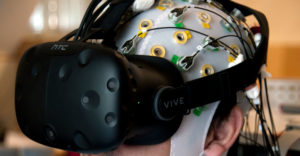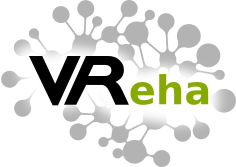Immersive virtual environments presented with virtual reality (VR) head-mounted displays allow complex, dynamic, multisensory stimulation with complete experimental control. The two main lines of research:
1. We combine VR setups with brain and body measurements, like EEG and ECG, for example to study cognitive processes and subjective / affective phenomena under more naturalistic (i.e., dynamic, interactive) conditions. For example, we decoded self-reported emotional arousal during an immersive VR experience involving virtual rollercoasters from EEG-derived parieto-occipital alpha power (Hofmann, Klotzsche, Mariola et al., 2021, eLife). We also developed an open-source Unity plugin to integrate bodily (e.g., heart, movement) activity in immersive VR (Excite-O-Meter project).

2. We develop and evaluate clinical applications of immersive technologies (foremost: VR). For example, in the “Virtual worlds for digital diagnostics and cognitive rehabilitation (VReha)”, we developed VR-based apps to assess and train cognitive capacities (visuo-spatial memory and executive functions) or help the diagnostics and rehabilitation of cognitive deficits in patients. A summary video can be found below: